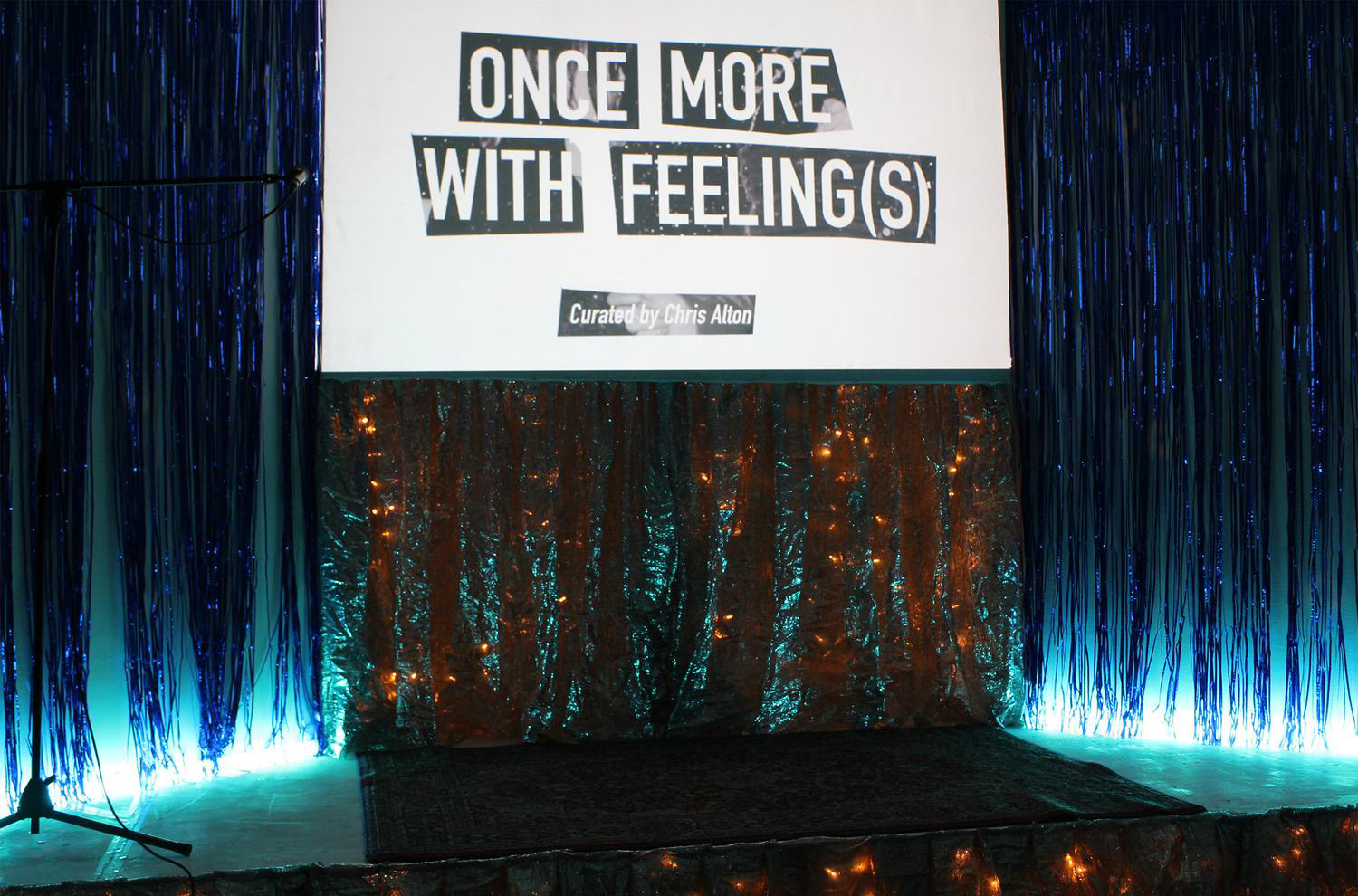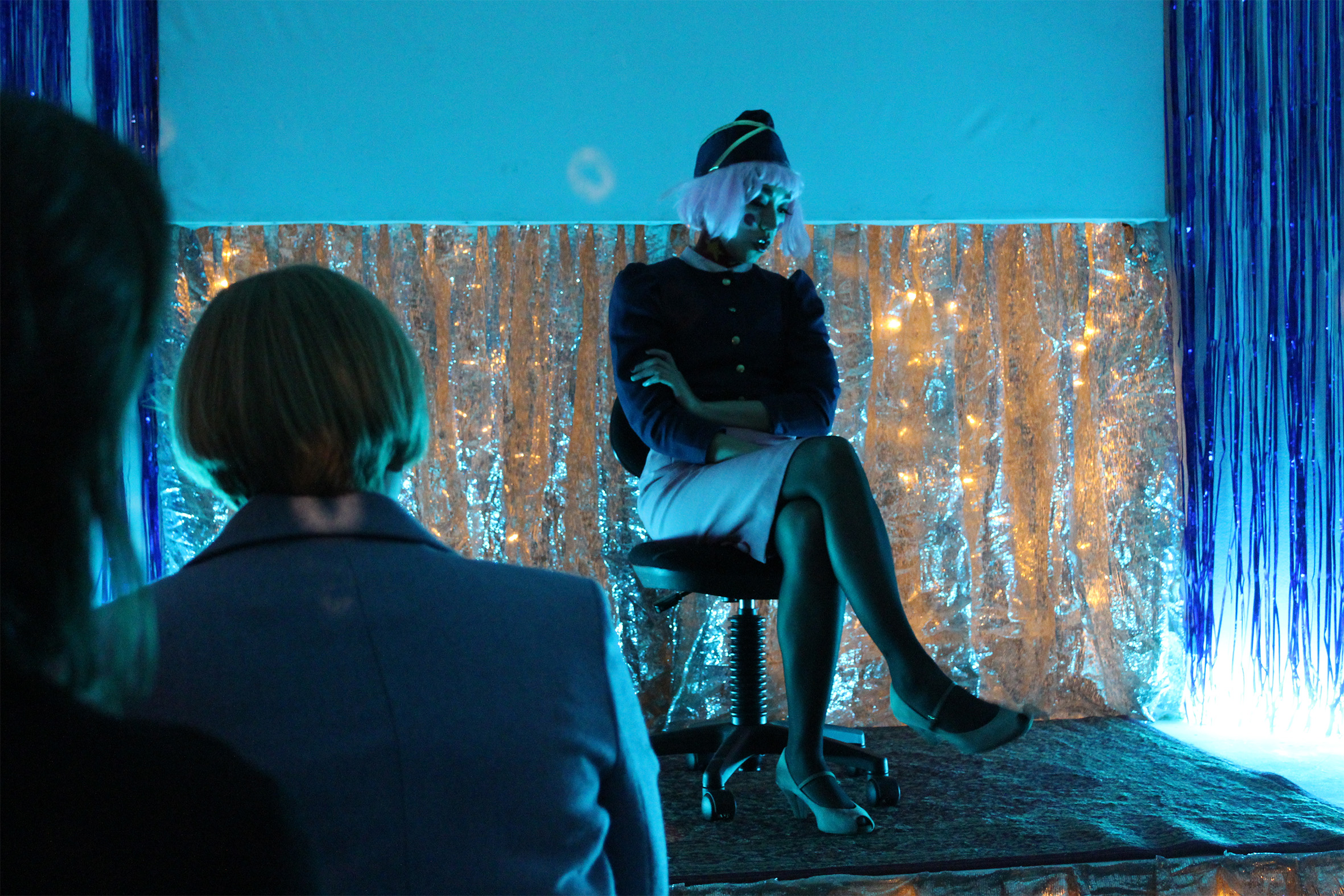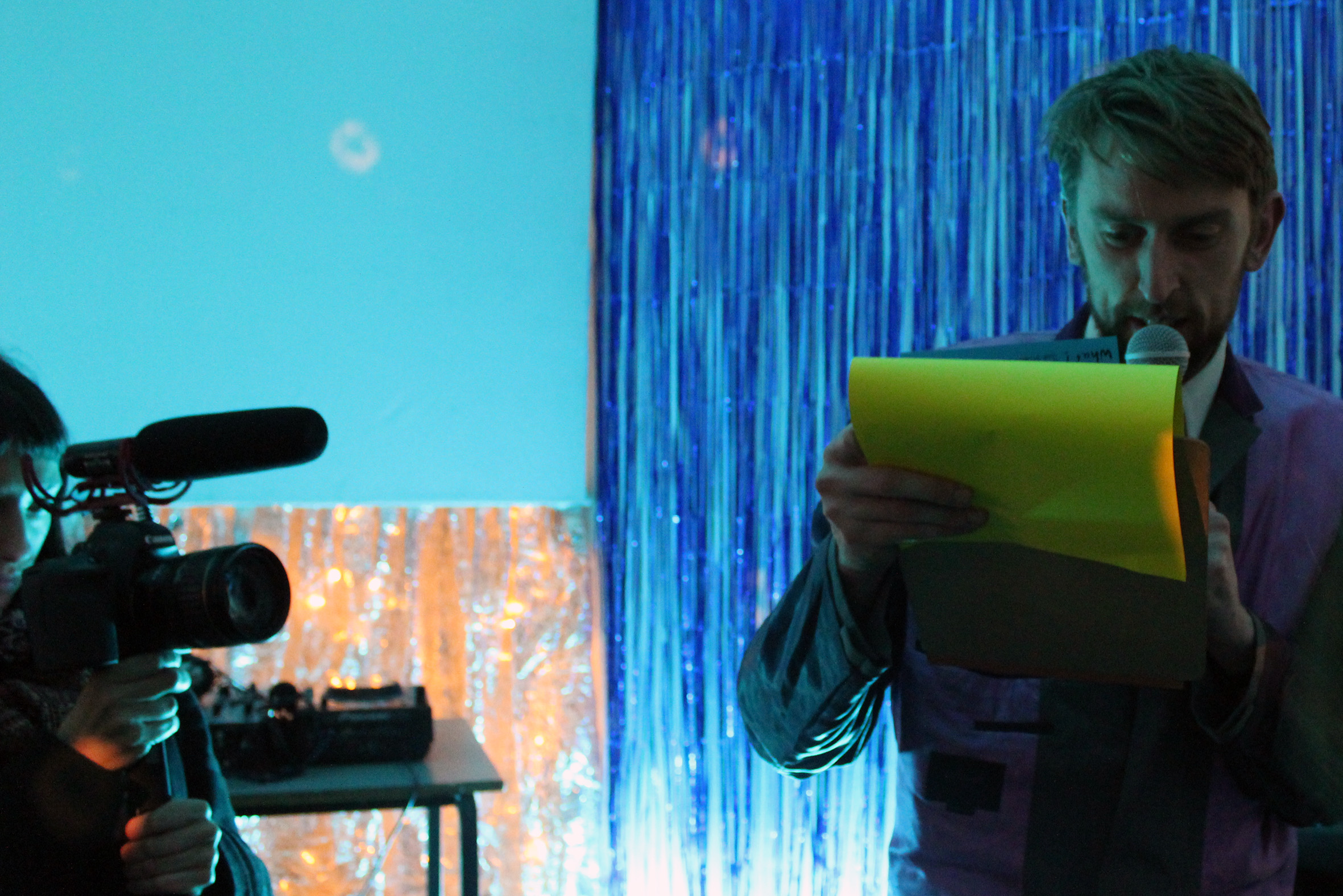




Once More with Feeling(s), Lewisham Arthouse, London, Oct 2015
Curated by: Chris Alton
Artists: Louise Ashcroft, Giles Bunch, Sophie Chapman, Lydia Cohen, Rose Delcour-Min, Alberto Duman, Joseph Ernst, Rosa Farber, Luke Faulkner, Liam Geary Baulch, Marco Godoy, Kerri Jefferis & Ellie Wyatt, Pil and Galia Kollectiv (WE), Sean Mullan, Rosa Nussbaum, Luis Rodriguez, Dominic Watson, Boy With Wings, Rafal Zajko
High definition, auto-tuned, pop perfection dominates the top 10s of music charts worldwide. Post production teams click and contort sound waves, creating mathematically managed melodies to accompany formulaic lyrics, destined by design to endlessly echo around our heads – or at least until the next big hit is released. We are spellbound by these self contained systems – they have become inaccessible, which in turn causes fascination. The ideal they personify is an impenetrable completeness.
But what about the imperfect? Something penetrable and incomplete. The cover version could be seen as the antithesis of such high production tracks. Covers are permeable, accessible and open to the ingress and egress of ideas. They are produced in bedrooms on poorly tuned acoustic guitars, recorded through laptop microphones and distributed freely online (1). These cover tracks are distinctly amateurish, injected with (intentional) errors and re/misinterpretations (2), which ultimately produce songs with the distinct background crackle of reality.
The cover version opts for rhythm over algorithm, coarse over smooth. By refreshing dormant tracks with renewed urgency (be it political, emotional or otherwise) the cover becomes a vehicle, delivering ideas through a familiar (if corrupted) form. Whether a pastiche or homage, the tangible authenticity of the cover version resides in the merging of art and life, consumer and producer, audience and author (3). The dissolution of these binaries opens up formerly homeostatic systems. They become permeable – susceptible to new ideas, new interpretations and new mistakes. This permeability can even retrospectively change the original.
Recently, physicists found evidence to support the proposition that a particle's current state isn't governed by what happened to it in the past. Instead its future state dictates its present – effectively meaning that time can go backwards at a subatomic level (4). This discovery is not dissimilar to various instances where cover versions have retroactively changed or displaced their originals. The timeline of cause and effect can become inverted on a macro level too – when this happens it is possible for a mapping of perception to be carried out in reverse (5). For example, having heard WE's (6) cover of I Want To Hold Your Hand by The Beatles, one could be forgiven for being unable to listen to the original ever again without detecting a distinct undertone of Kraftwerk-esque menace.
Other originals have experienced a similar fate. In 1979 Robert Hazard penned Girls Just Wanna Have Fun during a 15 minute stint in a motel bath (7). Hazard's original told the tale of a woman-obsessed lothario - it never made it past the demo reel. Four years later, Cyndi Lauper – having found the lyrics of the original to be too misogynistic - switched the line "All my girls have got to walk in the sun," to "I want to be the one to walk in the sun," and released it as her first major single. The track went on to gain recognition as a feminist anthem with Lauper describing it as a song, "for all the women around the world to remember our power". But don't forget Robert Hazard, he may be the answer to a trick question on a pub quiz when you're next down the local.
Similarly, Jimi Hendrix will continue to be misattributed as the author of All Along the Watchtower, amusingly Barry Manilow did not write I Write the Songs and eventually Hallelujah will have been covered so many times, by such a broad array of people (the list already includes; X Factor winners (8), Maltese Tenors and Irish-born priests (9)) that no one will remember that it was originally written by Jeff Buckley (10).
Whilst contemporary pop produces track after track of homogenous hits, the cover is an opportunity for subversion (11). It is a chance to riff on and compartmentalise the perfection of pop – a chance to dent or scuff surfaces buffed with too much polish. It becomes a means for messing with systemic issues, acting as a form through which people can express themselves more fully and in a plethora of ways, which the culture industry fails to accommodate for. Instead of a singular way of existing being pushed or embossed on the mind, there is a redux. The cover is an answer or riposte that resists unidirectionality. To cover is to create a dialogue – a feedback loop that resists being told what to think and how to behave. It is a radical rupture, which asserts that there is more than one way to be, to sing and to feel.
So let's have it...once more with feeling(s).
Footnotes:
(1) Even those produced with professional equipment will never be exact replicas of their originals. Regardless of how talented the musician or production team are, there will always be a degree of slippage.
(2) Karaoke, for instance, revels in the automatic failure to produce an exact copy. By default, it is expected that the performer will take ownership of the song, mis/reinterpreting it for better or worse. There is a joy in that which is unapologetically bad. We wallow in it. Where pop is about perfection and smoothness, the peaks and troughs of karaoke are jagged and cracked. It is a release. In the UK in particular, it is an anarchic excuse to be raucous. It is a space where the idols, perched atop their pedestals, are simultaneously glorified and ridiculed. When someone choses to sing a Tina Turner hit they are expressing their love for it, whilst simultaneously destroying the track to a new level (probably).
(3) Hito Steyerl, In Defence of the Poor Image, The Wretched of the Screen, 2012, page 40
(4) www.nature.com/nphys/journal/vaop/ncurrent/full/nphys3343.html
(5) A listener's perception of the original version of a track can be altered (permanently) by listening to a cover version. They may never hear the original in the same way again or may even prefer the cover.
(6) The band of artists Pil and Galia Kollectiv, who cover pop songs, replacing 'I' with 'We'.
(7) en.wikipedia.org/wiki/Girls_Just_Want_to_Have_Fun
(8) It's worth noting that (generally speaking) competitions like X Factor, The Voice, Pop Idol, etc. only allow their contestants to perform cover versions. The winner even releases a cover as their debut single. Here the cover is a device for reawakening dormant revenue streams by rekindling public interest in former hits.
(9) en.wikipedia.org/wiki/Hallelujah_(Leonard_Cohen_song)
(10) You just got trolled, I am well aware that the song was written by Leonard Cohen.
(11) The cover is not a guarantee of these things, instead it is an opportunity to be taken advantage of. It is a fertile territory for subversion, appropriation, reinterpretation, etc.
With thanks to:
Lewisham Arthouse